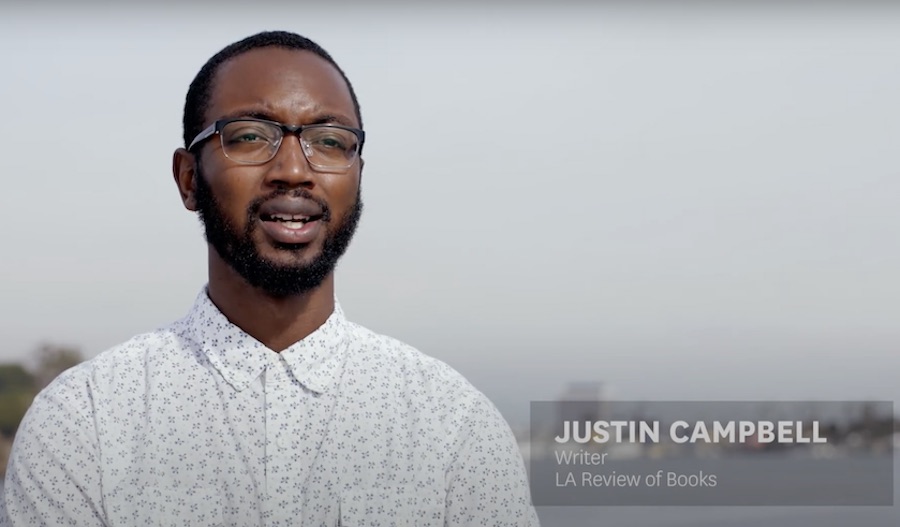
Graduate Program in English
A rarity among English graduate degrees, Loyola Marymount University’s signature Master of Arts program aligns with the university’s mission to educate the whole person and promote justice.
APPLY NOWProgram Overview
Students have the opportunity to specialize in one of three distinct tracks of study: Literature, Creative Writing, or Composition and Rhetoric.
The M.A. addresses the needs of diverse students – scholars planning to pursue doctoral studies, writers seeking to hone their creative craft in pursuit of publication, teachers at the high school and college level, and professionals working to cultivate critical reading and writing skills applicable to careers in the public sector.
Literature Emphasis
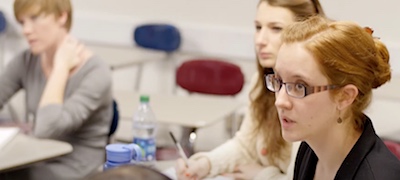
The Literature Emphasis offers a range of coursework in a variety of literary traditions. In addition to a strong background in major periods, authors, and genres, it offers innovative classes on topics including the anthropocene, critical race theory, queer theory, and more. Intensive work with faculty in our small department is encouraged, and independent studies on special topics may be arranged.
Degree Requirements:
Ten courses are required for the M.A. in English with a Literature Emphasis. You also must submit a Capstone Portfolio Project.
- Courses are 5000- and 6000-level.
- 5000 courses may have advanced undergraduates and cap at 25.
- 6000 courses are seminars for graduate students only and cap at 15.
- At least four courses for the M.A. must be 6000-level classes.
The normal time it takes to complete the degree is two years.
You Must Take:
- Critical Methodology (1)*
- Contemporary Critical Theory (1)
- Major Writer / Seminar in a Genre or Literary Period (1)
- Literature and Theory Electives (5-7)
- Creative Writing Seminar (0-2)
* This course must be taken in the first semester of study.
Rhetoric and Composition Emphasis
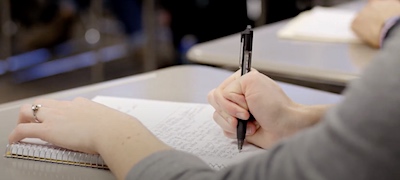
The Rhetoric and Composition Emphasis offers a range of coursework in Rhetorical and Critical Theory, and Composition and Pedagogy. The Emphasis offers innovative classes on topics including Rhetoric and the Media, The Confession, and Nothing. Intensive work with Faculty in our small department is encouraged, and Independent Studies on special topics may be arranged.
Degree Requirements:
Ten courses are required for the M.A. in English with a Rhetoric and Composition Emphasis. You also must submit a Capstone Portfolio Project.
- Courses are 5000 and 6000-level.
- 5000 courses may have advanced undergraduates and cap at 25.
- 6000 courses are seminars for graduate students only and cap at 15.
- At least four courses for the M.A. must be 6000-level classes.
The normal time it takes to complete the degree is two years.
You Must Take:
- Critical Methodology (1)*
- Contemporary Critical Theory (1)
- Major Writer / Seminar in a Genre or Literary Period (1)
- Literature and Theory Electives (3)
- Rhetoric/Composition Theory and Practice (3)
- Linguistics or Reading Theory (1)
- At least 2 of the elective courses should be literature or cross-listed as literature.
* This course must be taken in the first semester of study.
Creative Writing Emphasis
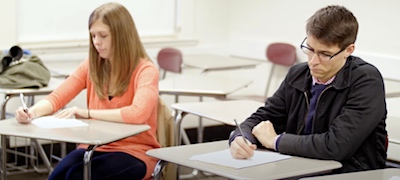
The Creative Writing Emphasis offers a range of coursework in several genres and modes of writing. In addition to strong fiction and poetry workshops, the Emphasis offers innovative classes including The Novella, Prose Poetry, The Personal Essay, Constraint Based Writing, Playwriting, and more.
Degree Requirements:
Ten courses are required for the M.A. in English with a Creative Writing Emphasis. You also must submit a Capstone Portfolio Project.
- Courses are 5000- and 6000-level.
- 5000 courses may have advanced undergraduates and cap at 25.
- 6000 courses are seminars for graduate students only and cap at 15.
- At least four courses for the M.A. must be 6000-level classes.
The normal time it takes to complete the degree is two years.
You Must Take:
- Critical Methodology (1)*
- Contemporary Critical Theory (1)
- Major Writer / Seminar in a Genre or Literary Period (1)
- Creative Writing Seminars (4)
- Literature and Theory Electives (3)
* This course must be taken in the first semester of study.
Course Offerings
Courses offered vary by semester. The courses listed below are offerings for Spring 2019. You can browse all available English courses in LMU's Bulletin. Courses listed at 6000 or above are graduate courses; 5000 and above are courses open to undergraduate and graduate students.
-
Course Title: English Literature of the Middle Ages
Section Times/Days: MWF 12:40 - 1:40
Instructor: Stephen Shepherd
Course Description/Principle Topics:
This course will examine English literature from its beginnings more than a thousand years ago through to the advent of the printing press in the late fifteenth century. With careful attention to detail, and a sensitivity to authorial intelligence in its critical, codicological, historical, theological, and philosophical contexts, we will study representative masterworks, including some by Chaucer and some about King Arthur.
-
Course Title: Caribbean Literature
Section Times/Days: TR 11:20-12:50
Instructor: Julia Lee
Course Description/Principle Topics:
This course surveys the literature of the Caribbean world in the 20th and 21st century. Topics include colonialism, creolization, migration, transnationalism, citizenship, and tourism.
-
Course Title: Contemporary Rhetorical Theory: Popes and Presidents
Section Times/Days: Tuesdays 4:30-7:00
Instructor: Steven Mailloux
Course Description/Principle Topics:
How do words change individuals and whole societies? Can attention to how words are used influence the way political and religious issues are publicly discussed in the current era of so-called “fake news,” “alternative facts,” and hyper-partisan debates? We will address these questions by examining contemporary theories of rhetoric: the use of language in a context to have effects.
-
Course Title: Poetry of Witness
Section Times/Days: Mondays 4:30 - 7:00
Instructor: Gail Wronsky
Course Description/Principal Topics:
A 500-level poetry writing workshop with an emphasis on writing activist/political poetry—poetry with a social justice agenda. Students will study poetry written in this genre, discuss the aesthetic complexities of the relationship between art and politics, write and revise their own poems of witness.
-
Course Title: The Poetry of Night
Section Times/Days: Tuesdays 7:10-10:10
Instructor: Sarah Maclay
Course Description/Principal Topics:
The poetry of silence, the poetry of night; the poem of the dream, the poem as dream: beyond nocturne, we can recognize a poetry of night by its embrace of threshold, space and silence; of the liminal and the surreal—less a terra firma than a terra unfirma. In this class, we’ll abandon the diurnal as we explore the writing of poems under the influence of masters of this terrain, following in their footsteps to create a final portfolio of revised work, several smaller studies on technique, and a final essay.
-
Course Title: Digital Humanities
Section Times/Days: Thursdays 4:20-7:20
Instructor: Paul Harris & Melanie Hubbard
Course Description/Principle Topics:
This course engages upper-division undergraduate and graduate students in the emerging field of Digital Humanities (DH) through projects grounded in the study and analysis of literary texts.
-
Course Title: Contemporary Critical Theory
Section Times/Days: Tuesdays 4:30-7:10 PM
Instructor: Dermot Ryan
-
Course Title: Capstone Portfolio
Instructor: Dermot Ryan
Course Description/Principle Topics:
The capstone portfolio is a culminating project that requires students to work under the supervision of an advisor to create a critical or creative portfolio that highlights his/her research or creative interests.
-
Course Title: Telling L.A.'s Story
Section Times/Days: Tuesdays 7:10-10:10
Instructor: Rubén Martínez
Course Description/Principle Topics:
How to tell the story of a city whose power structures – which just happen to be among the most powerful media companies in the world – regularly deploy representations that elide the communities resisting those very structures? That is the key question at the heart of “Telling L.A.’s Story,” a course that braids together multiple historical and contemporary narratives and processes them through various critical lenses to produce a three-dimensional view of Los Angeles.
-
Course Title: Early Modern Studies
Section Times/Days: Tuesdays 4:30-7:00
Instructor: Judy Park
Course Description/Principle Topics:
The ‘human’ occupies a central place in early modern art and culture in Europe. In this seminar, we will explore the human as a political category in sixteenth- and seventeenth- century English drama and theories of governance.
-
Course Title: Melville and Oceanic Studies
Section Times/Days: Wednesdays 4:30-7:00
Instructor: Robin Miskolcze
Course Description/Principle Topics:
By reading diverse sea literature by international authors influenced by Melville and viewing contemporary films in conversation with Melville and oceanic studies, we will theorize about how and why intersections between Melville and oceanic studies regularly and prominently occur in the world around us.
Accelerated Master of Arts

The Accelerated Master of Arts in English Studies (AMES) program is designed for top undergraduate LMU students who are pursuing a major in English and wish to complete the M.A. in English one year after completing the bachelor’s degree. Students admitted to the AMES program will take the 6000-level Critical Methodology course and two 5000-level English courses in their senior year (included in undergraduate tuition) that will count toward both the bachelor’s degree and the MA in English degree.
Professional Development
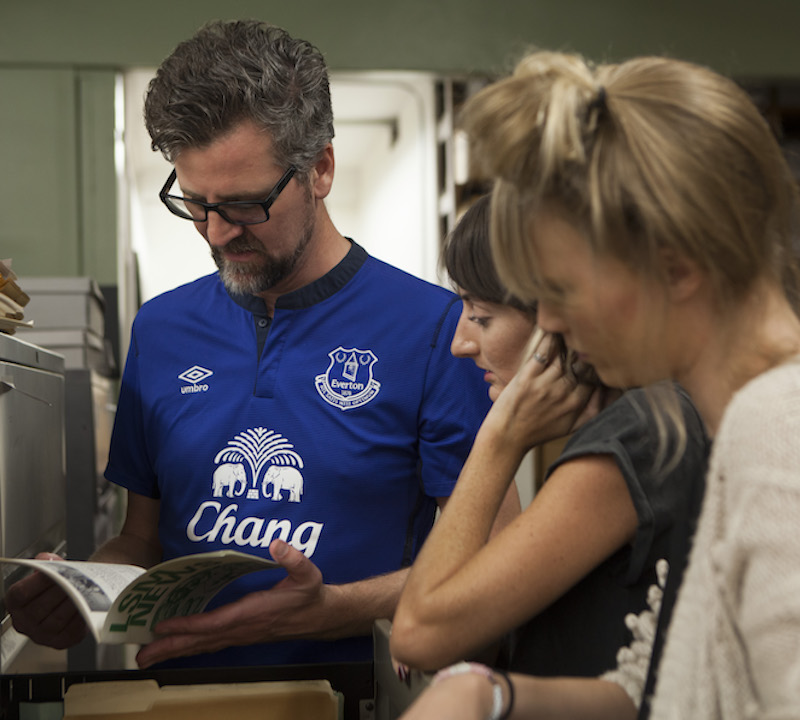
Mastering the Next Step
"Mastering the Next Step" is a professional development series that prepares graduate students for specific career paths. Sessions are lead by professionals across a variety of unique fields. Past speakers include:
- Naomi Eagleson, Owner of The Artful Editor and author of Radiant Field, spoke about launching her own editing company
- Julia Lee, Author of Biting the Hand: Growing up Asian in Black and White America, The American Slave Narrative and the Victorian Novel, Our Gang: A Racial History of “The Little Rascals,” and By the Book, spoke about her experience getting published
- Guadalupe Montano, Academic editor and adjunct professor at USC and Cal State Dominguez Hills, spoke about working as a professional editor
- K.J. Peters, Author of various academic articles and the textbook, The Argument Handbook, spoke about getting published as an academic author
Publications and Conferences
With mentorship from our faculty, English graduate students at LMU are encouraged to present their work at academic conferences worldwide and publish their work in peer-reviewed journals.
Learning Outcomes
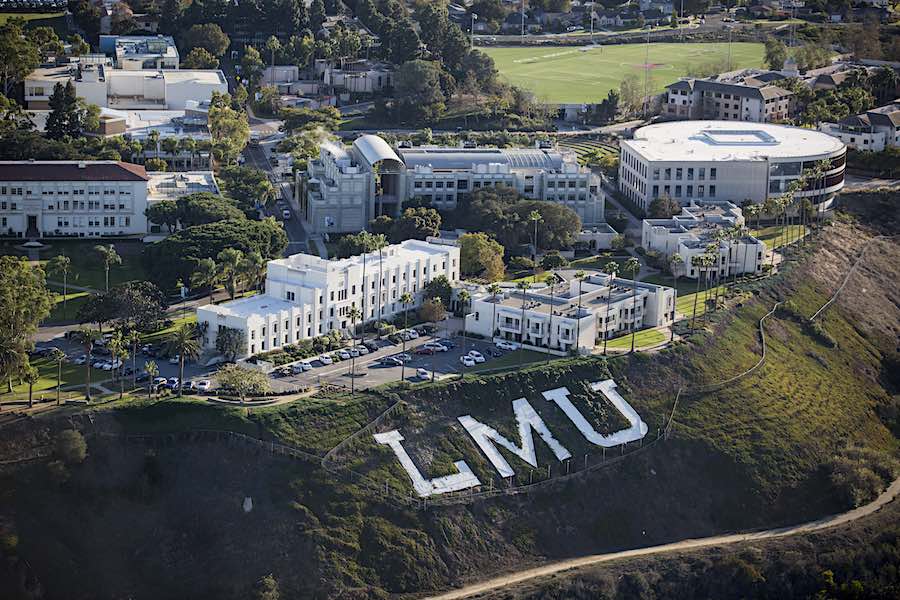
Students who complete the Master’s Degree in English will:
- Master the terms and issues specific to the discipline and profession of literary studies.
- Master professional writing skills for tasks including book reviews, abstracts, short critical essays, and research projects.
- Gain experience giving presentations and making submissions for professional publications and/or conferences.
- Engage critically and deeply with a range of literatures and literary theories.
- Engage critically the content and practices of your chosen emphasis (Literature; Creative Writing; Rhetoric and Composition).
The program prepares graduates for a range of professional paths. Some choose doctoral study in English, others teach at community colleges and high schools, and still others pursue writing-based careers in journalism, communications, and other sectors.
How to Apply

Admission Requirements
Candidates wishing to apply for the Master of Arts in English should have completed a minimum of five upper division undergraduate English courses with a 3.0 GPA. Demonstrating undergraduate or other prior experience in your desired track of study/Emphasis (Literature, Rhetoric and Composition, or Creative Writing) is encouraged, but not required. Deficiency in grades or coursework at the undergraduate level may result
in additional prerequisite course requirements at the undergraduate level which must be satisfied before an accepted candidate may begin work on the ten courses for the Master’s degree.
Priority Deadline is Feb. 14th. After Feb. 14th, applications will be accepted and reviewed on a rolling basis.
-
Completed Application
Link to the application here. You must create an LMU account to access the application.
2 Letters of Recommendation
All letters of recommendation should be submitted through the application portal. If you are interested in the teaching fellowship, at least one letter of recommendation should be from someone familiar with your experience in teaching, tutoring and/or leadership. If you are interested in the graduate assistantship, at least one letter of recommendation should be from someone familiar with your management, leadership and/or organizational skills. Get more information and apply to these programs by filling out the 2025-2026 Graduate Scholarship Application.
Official Transcripts
Official transcripts should be sent electronically directly to graduateadmission@lmu.edu.
Personal Statement* (1.5-2 pages)
Indicate which emphasis you wish to enter and discuss any relevant prior experience you might have had with the subject matter. If you are interested in the teaching fellowship, you should express why and chronicle any teaching, tutoring, or leadership experience that you believe will contribute to the role. If you are interested in the graduate assistantship, you should express why and chronicle any management, leadership and/or organizational skills that you believe will contribute to your term as Graduate Assistant in our M.A. Program.
Writing Sample* (10-15 pages)
All candidates should submit 10-15 pages of critical writing. You can submit two essays or one large essay.
Creative Writing Sample* (10-30 pages)
Applicants to the Creative Writing Emphasis should submit a sample of their best creative writing. It can be one long work or a collection.
*Please upload your personal statement and writing samples after you complete your online application. All work should follow MLA guidelines.
Financial Aid

Find Funding and Fellowships
Nearly all of our M.A. students receive some form of financial assistance to support their graduate study at LMU. Incoming and continuing students can apply for part-time stipended assistantships and fellowships, merit-based scholarships that defray the cost of graduate education. The program also offers funding to support student participation in academic conferences or conducting research. Please email us if you have questions about any of these opportunities.
-
Federal Direct Student Loans
Federal Direct student loans are available to eligible students. Please visit the Financial Aid Office website for application instructions and additional information.
Teaching Fellowships
Teaching Fellows serve as teaching assistants and instructors in LMU's undergraduate writing classes. This position offers excellent preparation for students interested in teaching English or writing at the high school, community college, or university levels.
- Teaching Fellows must be full-time students.
- Workload averages 15-20 hours per week.
2025-2026 Graduate Scholarship Application
Graduate AssistantshipThe English graduate assistant coordinates graduate student events, designs promotional flyers, manages the program’s advertising and website, prepares information packets, and conducts research for Graduate Director.- The graduate assistant is paid about $12,000 per academic year
- The graduate assistant must be full-time student
- Workload averages 15-20 hours per week.
2025-2026 Graduate Scholarship Application
Communications Graduate Assistantship
The Bellarmine College of Liberal Arts (BCLA) is seeking a Communications Graduate Assistant to support a diverse portfolio of communications initiatives for the College, including storytelling, event marketing, website maintenance and quality control, email marketing, and graduate program communications. Strong writing skills and an appreciation for liberal arts education are essential; skills in Adobe Creative Suite or web content management is desired. This position is excellent preparation for a student considering a career in professional writing or higher education.
To apply, submit a resume and cover letter to Alison Mullin, Communications Manager: alison.mullin@lmu.edu. You may submit materials at time of application, but you will not be considered for the position until you have been admitted.
Library Intern in Hannon Library’s Special Collections
Manage appointments for visitors to the archive, update and download available texts for the library’s database, work with other special collection librarians to learn archiving and textual research skills. The Library Intern is responsible for curating an archival exhibit for the library's special collections exhibit space.
- Intern is paid about $12,000 per academic year
- Intern must be a full-time student
- Workload averages 15-20 hours per week
Application requirement
- A brief letter expressing why you are interested in the position and any library experience and/or organizational skills that you believe will contribute to your term as Library Intern in our M.A. Program
- Two references who will support your application for a LI. Please provide their name, address, email, and phone number.
Department Scholarship
Merit-based scholarship is awarded by the department on a yearly basis. All applicants will have the opportunity to fill out a scholarship application during the application process. Current graduate students must submit a 2025-2026 Graduate Scholarship Application
If you have any questions, please email the English graduate assistant at english_gradasst@lmu.edu.
Travel Request Form
Funding available for conference presentations. Each student is limited to one conference per year, the student must be presenting, and a report is due after the conference. Travel Request Form must be submitted as soon as possible.
Spring Writing and Research Award
The Spring Writing and Research Award is awarded to returning graduate students for research and writing, which may include travel to research site(s) or conference(s) and/or supplemental income to support the writing and revising of a research paper or a piece of creative work. The deadline to apply is April 9, 2021. Interested students must submit a Spring Research Award 2021.
University-wide Resources
- Email the LMU at finaid@lmu.edu to discover the full range of funding opportunities.
- In addition to our English assistantships listed above, the university also offers a range of half-time across campus. Those assistantships are available to all LMU graduate students, and current or incoming students can apply using the form on their website.
